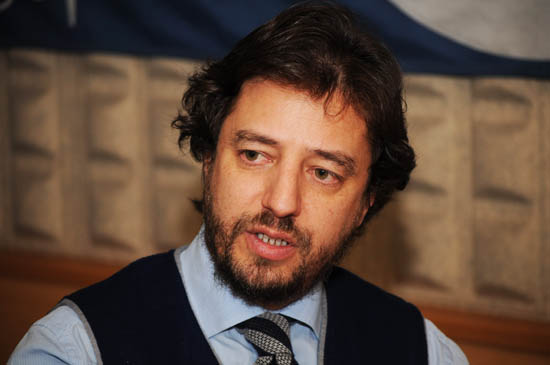 Miguel Poiares Maduro, the academic who left the European University Institute, in Florence, Italy, for the position of Deputy Minister for Regional Development, is today in the Algarve to launch the national tour of launching the Operational Programs in the context of Portugal 2020, the European funds for the period 2014-2020.
Miguel Poiares Maduro, the academic who left the European University Institute, in Florence, Italy, for the position of Deputy Minister for Regional Development, is today in the Algarve to launch the national tour of launching the Operational Programs in the context of Portugal 2020, the European funds for the period 2014-2020.
The session was initially planned for the Grand Auditorium of the University of Algarve, but had to be moved to Teatro das Figuras, with greater capacity, such was the interest shown.
O Sul Informação and Rádio Universitária do Algarve interviewed minister Poiares Maduro exclusively, during almost an hour of conversation about the new cycle of European funds, how they will be applied in the Algarve and in the country and also the decentralization process that the Government has started.
For the whole country there will be almost 26 billion euros, for the Algarve it will be a record value of close to 320 million. But there are new rules and new priorities.
Sul Informação/RUA- What does Portugal need to grow sustainably and not fall victim to any shock, no matter how small, in the European or world economy? What remains to be done?
Miguel Poiares Maduro – In order to grow sustainably, we must grow with international competitiveness, that is, we must have an exporting economy, not economic growth that depends on internal demand, which generates external imbalances and indebtedness. That's what happened over many decades and that, in the course of 40 years of democracy, we have, three times, had to ask for outside help. Having reached a situation of bankruptcy, which entailed very serious sacrifices for the Portuguese.
Since 2000, when we joined the Eurozone, the country has diverged from Europe again, after years of converging. We had a decade in which, in addition to practically not growing, unemployment was getting worse and indebtedness was enormous. The country was indebted exponentially, particularly in the last years of that decade. This is what generated later the situation of near financial bankruptcy in which the country found itself.
For us to be able to ensure economic growth for the Portuguese in the future, to have better living conditions, but with sustainability, we must base this on a model of sustainable economic growth, but for that, being competitive in a global and open economy is fundamental.
SI/RUA- In 2014, Tourism in the Algarve reached numbers like never before, but the region continues to have a serious social problem of unemployment, with the highest rate in the country. What continues to go wrong and what can be done to correct it?
MPM - This is an interesting question and one that, moreover, is related to the priorities that have been defined for the Algarve in terms of European funds, in other words, where we are going to direct most of the European funds.
Overall for the country, the big bet is on the competitiveness and internationalization of our economy. 40% of Portugal 2020 funds will be to reinforce the competitiveness and internationalization of our economy. In the Algarve too, the big bet is there.
One of the problems that the Algarve has faced is the fact that a large part of its economic activity is concentrated in Tourism and Real Estate. The Algarve, if memory serves me correctly, is the fifth region in Europe with less industrial economic activity. It is one of the regions in Europe with a concentration of its activity in a few sectors, in this case Tourism and Real Estate.
Poiares Maduro: «The economic crisis has created immense unemployment in the Algarve's Real Estate, which is structural unemployment and difficult to solve. There is another unemployment that has to do with Tourism and that, as Tourism improves – and has improved – it falls, and even in the Algarve it has been falling»
Therefore, the economic crisis that arose created immense unemployment in Real Estate in the Algarve, which is structural unemployment and difficult to resolve. There is another unemployment that has to do with Tourism and that, as Tourism improves – and has improved – it falls, and even in the Algarve it has been falling. The evolution has been positive due to the results of Tourism.
But what we have to do for the future, in the Algarve, is to expand the value chain. That is, on the one hand making it not just Tourism and Real Estate, but revaluing activities such as Agriculture and the Sea, and on the other hand making activities that are related to Tourism can bring more economic value to the Algarve.
Activities such as traditional products, the Nature area, and then the Leisure economy, which are related to Tourism but are not traditional Tourism activities, generate more value from these activities. That is what the Algarve Operational Program, CRESC, is aimed at. It is to respond to these challenges.
The Algarve is one of the regions of the country that, even so, has a higher rate of development, which is, in fact, one of the reasons why it does not have as large a volume of funds as other regions, such as the Alentejo, for example. Because in terms of GDP per capita it is above these regions and therefore, according to European rules, it has a smaller share of financing.
But it is also because of the perception that we had that, at the time, this crisis had had a particularly aggravated impact in the Algarve, that we, within what was possible under European rules, reinforced as much as possible the transfer of funds from other regions to the Algarve.
We had the perception that what is the structural value that the Algarve traditionally represents in terms of GDP does not correspond to the current situation of crisis that the Algarve was going through. In this sense, we have reinforced the Algarve by almost 70 million, transferring from other regions, and generating a global endowment of almost 320 million.
SI/RUA – You are an academic called on the Government to coordinate a portfolio that involves managing 25 billion euros of community funds…
MPM - More than 25 billion, that's almost 26 billion. All euros count.
SI/RUA – For a layman, it is the person who has the knife and the cheese in his hand. What do you want the country to do with these nearly 26 billion?
MPM - Over the decades, particularly since joining the European Communities, today the European Union, the country has had a remarkable evolution in terms of infrastructure and public facilities. Today, at this level, for example on the road network, we are at the top or clearly above the European average.
Where we were unable to overcome the challenges we had was in the competitiveness of our economy, on the one hand. On the other hand, at the level of social cohesion. Portugal is one of the most unequal countries in Europe and one of the countries with less social mobility. In other words, those who are born poor are less likely to rise in life, regardless of their merit.
It was towards these two great structural challenges that we directed the funds. In terms of the volume of funds we distribute - more than 40% for competitiveness and internationalization, not counting human capital, which is another 20% and which is also instrumental, in the long term, for the competitiveness of our economy -, and also a very big bet on social inclusion.
Poiares Maduro: «For the first time we have an Operational Program only on Social Inclusion and Employment, we tripled the funds for Social Inclusion itself, we created new programs, such as Portugal Inovação Social»
For the first time we have an Operational Program only on Social Inclusion and Employment, we tripled the funds for Social Inclusion itself, we created new programs, such as Portugal Inovação Social, which is a program that, among other pillars, supports Entrepreneurship Social, that is, to economic activities that, in addition to the traditional, purely commercial economic added value, produce social added value.
For example, companies that only hire people in social exclusion sometimes find it more difficult to obtain financing from the banking system. We have created a financial instrument to support this type of company, which has this social or environmental concern, and to value this type of economy.
Therefore, there is a whole set of matters in which we define competitiveness and social cohesion as priorities.
But setting right priorities is not enough. We also worked hard on changing the management and governance model for European funds, simplifying their rules, increasing transparency and what we call results orientation.
In other words, the funds will no longer finance projects, they will contract results. We will finance according to the results obtained. It is not enough to have the right priorities, it is essential that the rules for allocating funding, that the evaluation and selection mechanisms are conducive to ensuring that these priorities are actually achieved. And then contracting results is essential.
SI/RUA – But this also forces the CCDR to be more on the ground, to know at all times how the funds are being applied.
MPM - Yes. Not only on the ground, and I think that the CCDRs have done, we have management teams in the CCDR and in the regional Operational Programs that are basically in the CCDR. It is extremely important to be proactive.
As I had the opportunity to say today [yesterday] at the inauguration of the presidency of the CCDR Algarve, it is essential that they take over the roles that had been somewhat lost over time. One is in the training of actors. We will not be successful if we do not have the public and private actors who apply for the funds, trained.
Where funds worked best is where there was good leadership, where projects were good. This requires skilled actors, people with leadership capacity, with the necessary qualifications, instruments and capabilities.
Afterwards, it is also essential that the CCDRs have more and more the ability to have an anointing of strategic reflection on the region in which they are inserted. This is a component that we want to emphasize and that has already started in the preparation for Portugal 2020.
The Algarve Operational Program is related to what has been called an Intelligent Specialization Strategy for the Algarve, which defined what the constraints are, what the challenges were and in that light where should the largest share of funding be directed. .
SI/RUA – In Portugal, we are very good at identifying problems, but then there is something that fails. What does it take for this new community support framework to take a turn in this regard?
MPM - First, a precision: I agree that we are good at identifying problems, which is different from making a good diagnosis of problems. The difference is crucial. Diagnosing means understanding why we have these problems. Sometimes we identify problems, but we never analyze them properly, with the necessary information, with the analytical tools that allow us to make a good diagnosis. And this diagnosis is what we did with these strategies.
Then, for us to be successful, we have to change institutional cultures, the way we all function, where we direct our action and how we ensure that the funding we give will change the behavior of actors.
In other words, how do we ensure that the funding we give, for example in terms of vocational training, has an impact, unlike in the past, when we trained literally millions of people, but this had little impact on the qualifications of the Portuguese and the improving our productivity.
How do we do this? In a very simple and, at the same time, very demanding way, which is this result orientation. For example, in the case of vocational training, that is to say: the funding that will be allocated to training schools, the funding to those who provide training will depend on the results in terms of employability obtained.
What does it do? It changes the incentives for those providing the training, who will have to think very carefully about whether the training they are providing corresponds to the needs of the market, or else they will not achieve employability, which will then allow them to obtain the funding they want from the funds. You will have to think very carefully about the quality of the training you give, because if you don't, this training won't get the funding. And it will have to design active policies to support its trainees' entry into the labor market.
I could give another example regarding support to companies. These supports are now refundable. This is the rule. The company obtains support and will then have to repay it, as if it were bank financing, albeit without interest rates. However, the company may be exempt from part of this reimbursement if it exceeds the contractual results. Before, companies had a non-refundable part and a refundable part.
Poiares Maduro: «The financing is not given to the project, but based on the contracted result. What will this promote? Higher productivity, higher exports, increased research and development within companies'
It's all refundable now. But companies will be able to transform part of the refundable into non-refundable financing in proportion to the surpassing of the results. In other words, if a company contracts, to obtain financing, certain results in terms of exports and says “I will increase my exports by 10%”.
If you do, the company has to reimburse you and nothing else. But if you overcome this, and as you do, then there will be a progressive exemption from the reimbursement obligation, so that there is also an incentive for companies to surpass the results. Once again, the financing is not given to the project, but based on the contracted result. What will this promote? Greater productivity, greater exports, increased research and development within companies, which is what we want.
SI/RUA – 2015 is the year of elections and by coincidence, it is now that the new community support framework is taking place…
MPM - (laughing) These tables are seven years old, I don't think the European Commission has fixed this given the Portuguese elections and decades in advance...
SI/RUA – But do these coincidences bring any benefits in terms of the calendar for the coalition in the Government?
MPM - But you can't and shouldn't mix things up, nor will we. European funds are not being programmed in the light of the elections, in the light of the next seven months, but of the next seven years and that is how it should be. They are a fundamental opportunity for the country that we cannot waste.
What we had was the perception that the particularly difficult financial situation for the country, the fiscal adjustment and consolidation that we had to carry out, mean that we have major constraints in terms of investment. And that, therefore, it was important, as soon as possible, to put the new cycle of European funds, Portugal 2020, into operation. And we made this effort not because of the elections, but because for the country it is essential to have the maximum available financial means to invest, in a situation in which, from a budgetary point of view, we have limits and continue to have major constraints.
We have improved a lot, we are finally getting out of the crisis, recovering, getting back to economic growth, we are recovering incomes, unemployment has been falling, but investment is essential, and in that sense European funds are very important.
And it is in this light that, closing the current programming cycle, which ends at the end of this year, but also starting a new cycle, we will manage to put 4 billion euros of funds into the economy this year, which is the most highest ever placed in the economy in a single year. This will help the country, not to help the elections.
SI/RUA – Why did the minister choose the Algarve to start the national tour of launching the Operational Programs in the context of Portugal 2020, the European Funds for 2014-2020?
MPM - We have been very concerned about decentralization. In this sense, we wanted to start this tour outside Lisbon or Porto. It is symbolic of this concern with decentralization in this program. This is the cycle of European funds in which there are more funds managed in close proximity to the populations. On average, regional operational programmes, managed in closer proximity, have a 27% increase in funding.
We have local and social economic development strategies, associated with the Intermunicipal Communities, which will also have contractual funds, to be managed by these Intermunicipal Communities, but according to plans that will be independently evaluated and contracted with the funds.
Why? Because we want to value this management capacity with proximity, but at the same time promote the articulation of investments on a supra-municipal scale. One of the problems we had in the past was the circumstance that we sometimes had investments that were doubled in neighboring municipalities and that later became, each one of them, unsustainable.
It wasn't here in the Algarve, but recently I visited a municipality that had a closed municipal swimming pool, and the three neighboring municipalities all had municipal swimming pools, all of them closed. That is, four municipal swimming pools, financed by European funds, which became unsustainable, because each of the municipalities itself could not have enough people to use and make this equipment financially viable, when it would have been possible to have only one or two, if they were shared. And so one municipality has a swimming pool, the other has a library, a third has a cultural center.
We have to develop strategies that link these interventions and the investments of the different municipalities. Hence the importance we give to these territorial interventions integrated at the level of Intermunicipal Communities, valuing this space for cooperation. But it is also an example of this greater decentralization.
At the level of Portugal 2020, we are very concerned about decentralization in the management of the program, which has never been seen in the past.
Starting here in the Algarve is also representative of this concern with decentralization and the importance of territorial cohesion.
SI/RUA – You spoke about three issues: decentralization, proximity in the management of funds and cooperation. Are these the fundamental aspects in this new phase of funding programming?
MPM - They are and have to do with a new vision of local administration, which is also under my tutelage. Local administration in Portugal has made a remarkable evolution over the last three years, as a result of the efforts of the mayors and of the structural reforms, which were several and which allowed, for example, that the local administration had reduced late payments by more than 70%. This is not only good for the financial balance of municipalities, but also good for the local economy.
Poiares Maduro: «The local administration in Portugal has made a remarkable evolution over the last three years, as a result of the efforts of the mayors and of several structural reforms»
It also made it possible to reduce indebtedness by 29%, even with budget surpluses. It is this new reality of local administration that also gives me confidence in the new role that I think municipalities have to play in terms of European funds.
The priority is no longer infrastructure, public equipment. I usually say to mayors that they will no longer be evaluated in the future so much on the basis of physical work, but on the economic and social development of their municipality. With the employability rate achieved in your county, with the rate of investment attraction, with social inclusion policies, with the quality of education in your county.
It was, in fact, in this sense, that we created the Municipal Transparency Portal, which is a very powerful instrument for citizens and residents. It has more than 100 indicators that allow you to compare your municipality with any other in the country, in terms of financial management, employment created...
SI/RUA – Here in the Algarve it's a portal that has been talked about a lot, sometimes not for the best reasons…
MPM - …for unfortunate reasons, because some municipalities have very serious financial imbalances. Precisely for this reason we created a structural instrument, namely the Municipal Support Fund, to support the financial reorganization of municipalities. It is part of the set of reforms that allow the remarkable evolution of the municipalities.
European funds will support this new role for local authorities, just as the decentralization program we are launching, in terms of education, health, culture and social security, through pilot projects, is also representative of this role. new from the municipalities.
SI/RUA – But the mayors, through the National Association of Portuguese Municipalities, and the opposition, are not very happy with this decentralization, this delegation of powers to the municipalities.
MPM - The opposition is already very much in electoral mode and therefore already has difficulty, unfortunately, in separating things. I would hope it wasn't like that. During this period in which I came into politics, I have made a great effort to contribute to a policy that values both commitment and political antagonism, because I think both are necessary. We in politics need confrontation, antagonism, but we also need willingness to seek consensus.
The opposition is already in electoral mode. I still haven't figured out exactly why they contest decentralization. The vast majority of municipalities are available to participate in this process. There is in fact an opinion voted by a majority in the ANMP, which raises some reservations. We've already responded to some. I don't want to think that this opinion has to do with party political issues, I prefer not to think about it.
But we have also had many municipalities, in fact even from other political colors, that have expressed interest in participating in this process. The main guarantee that we respect local autonomy and the freedom of municipalities is the fact that membership is voluntary.
We are advancing ambitiously in the fields – education, health, social security, culture – but cautious in the method. Like? Creating pilot projects, in a group of municipalities, in these areas, evaluating them, monitoring them, and then, based on that evaluation and monitoring, then yes, eventually generalizing to the whole country. Thus, generating credibility and confidence in this decentralization process.
But with three fundamental principles: first, equal and non-discriminatory access for any of the municipalities; second, out of respect for the autonomy of local government, membership is voluntary. We do not impose any competences on the municipalities, anyone who wants to participate; third, with this delegation of powers, the financial backpack goes to the municipalities. In other words, what the State spends on these services is what will be transferred to the municipalities.
Poiares Maduro: «We have also had many municipalities, in fact even of other political colors, that have expressed interest in participating in the process» of delegation of powers
Decentralization allows for more immediate accountability, greater and better information about problems and therefore better solving them, allows for an adaptation of public policies and services to the reality of the territories.
It makes sense that part of the schools' curricula meets the local reality. Here in the Algarve, we have, for example, tourism. It makes sense that part of the curriculum addresses this economic reality and has some formative component in this area.
It makes sense that health centers have schedules that correspond to the interests and needs of the population in each territory, which can vary or are articulated with local public transport.
In all these respects, we have a lot to gain from decentralization.
SI/RUA – The pilot projects have already been defined, do you know which municipalities will join, namely here in the Algarve?
MPM - We are concluding these pilot projects with a number of municipalities. I won't get ahead of myself. There have already been municipalities that have publicly stated that they are talking to the Government on this matter, but I will not anticipate this.
SI/RUA – We have already noticed that the financial backpack is coming, but with the constant cuts that have taken place in recent years, is there no fear that it will be depleted?
MPM - Not! This backpack is defined based on the principle that what the State spends goes to the municipality, assuming that decentralization will not create greater public expenditure. But then there is monitoring and a guarantee that this funding is maintained. And this is very important for the municipalities.
More: municipalities can, at any time, leave the process. With advance notice, as they won't leave midway through the school year, but they can. This is a guarantee for the municipality that they will have the financial means.
Furthermore, decentralization can also generate savings. Imagine that, in relation to a health center or a school, the municipalities already have construction and gardening services, which they can use for this new equipment. If it is the central administration, it usually has to make another contract, which doubles the costs. However, if there is a cost saving, the so-called efficiency gains, in this matter, which are attributed to the municipality, will have to be invested in the improvement of this public service. They don't disappear into thin air, they aren't allocated to another area. It has to be used to improve that public service.
So, I think the opposite will happen: the efficiency gains that are generated with the management of these matters at the municipal level, will allow a reinforcement of investment in these services and public policies.
SI/RUA – What brings you here to the Algarve is to start the presentation of Portugal 2020, in this case, the presentation of the CRESC Algarve 2020 Operational Program. In practice, what changes will there be, both for companies and for public entities and how can they be used by the region?
MPM - At the level of the Algarve's priorities, there are some that have to do with extending the value chain associated with traditional sectors, in particular Tourism. Also associating the leisure economy and traditional activities that can benefit from tourism, but also value it.
There is a project in the Algarve that I have used as an example in many parts of the country: TASA [Ancestral Techniques, Current Solutions]. It is a project that brings together artisans and young designers and is an example of the kind of competitiveness we need in our country. It's what I call smart competitiveness.
The competitiveness that Portugal needs to win in a global economy is not an “imported” competitiveness. In other words, it is not an economic activity that is totally foreign to our territory, which can arrive in one day, but it easily leaves the next day in search of lower wages, elsewhere in the world.
What we need is an economic competitiveness that values, adds value to the endogenous resources that exist in our territory. And here in the Algarve we have nature, heritage, the rehabilitation and strengthening of historic and riverside centres, the economy of the sea, agriculture. Areas of traditional activities will be valued and benefit from investments.
At the same time, we are going to make an important bet in terms of people qualification, training. Since we're going to guarantee that the actions of training, qualification and combating unemployment – and a good part of it is structural – have better quality, through the rules I've already mentioned and the such requirement of contracting results.
We will also demand greater criteria and quality in public investments. From the outset, the investments of the municipalities, either through these integrated strategies on an inter-municipal scale, coordinating investments between different municipalities, so that there is no duplication, but coordination and articulation between the investments made, but also requiring a prior mapping. In other words, there will be no support for new social facilities without an identification of existing facilities, to avoid the duplication that happened in the past and that made investments not sustainable and meaningless.
Poiares Maduro: «We have mobilized as much financial resources as possible, within European funds, to support the Algarve in this change, in response to and exit from the crisis»
Whether in terms of the priorities that were defined, or in terms of award criteria, or in terms of evaluation criteria, we have put in place a whole set of rules, principles and modes of operation that will guarantee that what we want - that is to promote competitiveness, employment, social cohesion and environmental sustainability – it will be achieved.
SI/RUA – This new Community Support Framework for the Algarve has new features. Firstly, the fact that there is more money, but also the possibility that the region may have support through other programs to which it had not had access. Why is there this modification?
MPM - We have tried as much as possible, given the particularly difficult situation that the Algarve has been facing, to expand the Algarve's access to the maximum number of programs and funding possibilities. And that's what explains all these instruments.
The Algarve, according to European rules, is considered a transition region – not one of the least developed, but one of transition, as it has a GDP above 75 percent of the European average, which brings constraints in relation to the volume of funds that can be attributed to the Algarve – which was very important to take into account the economic reality and the difficulties that are experienced here. Because the Algarve was one of the regions, if not the region of the country, that had the most serious and serious impact of the economic and financial crisis in Portugal.
We tried to respond to that, mobilizing as much financial resources, within European funds, as possible to support the Algarve in this change, in responding to and out of the crisis. But it is important that this exit be made with sustainability. Hence the importance of support not being just to maintain the economic structure that existed in the Algarve.
We want to qualify Algarve tourism, so that it has greater added value. That it is more diversified, that it has a stronger nature component, that is not so dependent on seasonality. Have other economic activities that, even in relation to tourism, have autonomy, such as handicrafts, traditional products, canning, everything that has to do with the sea, agriculture… there are extraordinary endogenous agricultural products from the Algarve that have to be valued. We also have the part of renewable energies.
All of these are areas in which the Algarve can invest, taking into account its natural, heritage and traditional resources.
SI/RUA – This Wednesday there will be a full house for the presentation of Portugal 2020, in Faro, in such a way that they had to change the location, because the original did not have enough capacity. This reveals that there is great curiosity among entrepreneurs in the Algarve. A question that often arises is when contests are opened. Some have already been opened, but when will you get up to speed?
MPM - Several have already been opened, including for companies. They will come into cruising speed throughout the month of March. We will have an annual calendar for the opening of competitions. It sounds simple, but it is very important for companies, social actors, civil society and associations, all of them potential beneficiaries, as it will allow them to know in advance which competitions they will open, identify which ones they want apply and plan your projects and applications in advance.
But, throughout the month of March, there will be multiple competitions that will open, including here for the Algarve.
SI/RUA – The Government created the Portugal 2020 portal, so that the Portuguese can monitor the progress of the programme. This is not a bit of folklore, is it really supposed to work?
MPM - Not! People will be able to see it. At this moment, all the competition notices are already there and, whenever a new one appears, it will be immediately published on the site.
Then, as the projects are selected and financed, we will have all the funding allocated, so that the Portuguese can know where the money from the funds is used, who gets it and what objectives were contracted, because transparency is a very big goal for us.
It is also our objective to put the results obtained at the end of the project. It will be possible to know all this, easily, through the portal. I think it's very important, because transparency is fundamental for us. Transparency regarding the results, regarding the funding allocated, but also, and hence the calendar of competitions, regarding the funding opportunities that exist. Because we also want to broaden the base of recipients of funds and allow for greater access to funds. May there be more companies, more social actors, competing for the funds. It is one of the reasons why we are doing this roadshow, this presentation of Portugal 2020 by the regions of the country.
I am very pleased to be having this success here in the Algarve, with more than 800 people registered. And they had to close registration because there is no place here that allows for more people.
Interview with: Elisabete Rodrigues/Sul Informação and Pedro Duarte/RUA FM
Photos of: Martyna Mazurek/Sul Informação
Listen to the entire interview, this Wednesday, at 19 pm, on RUA FM (00 or www.street.pt).
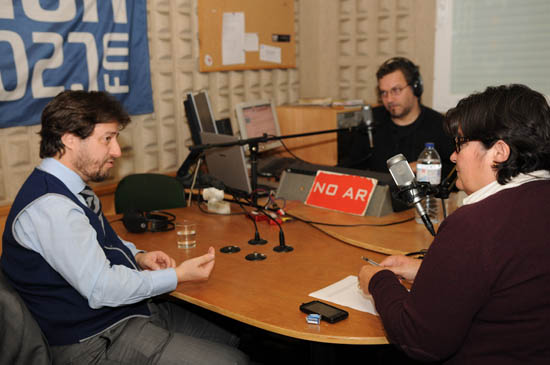
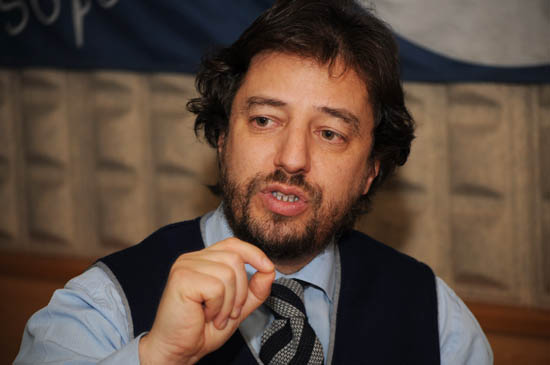
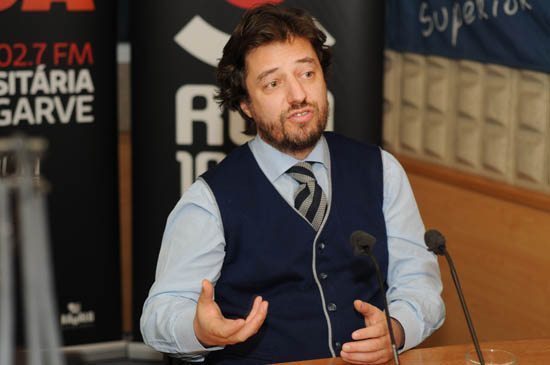
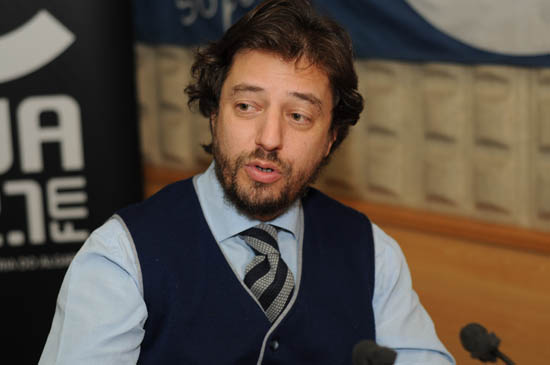
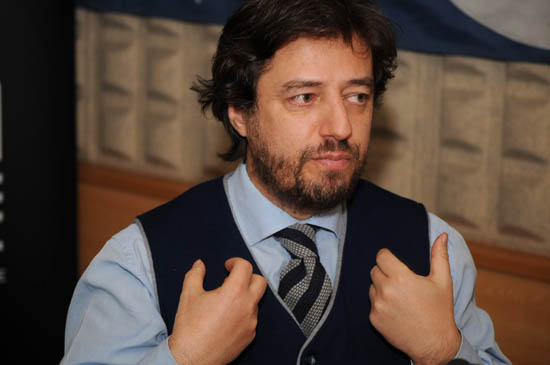
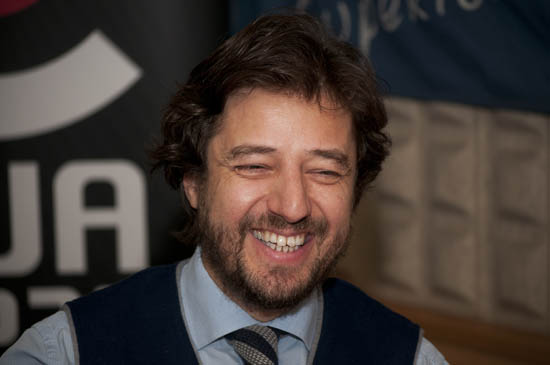
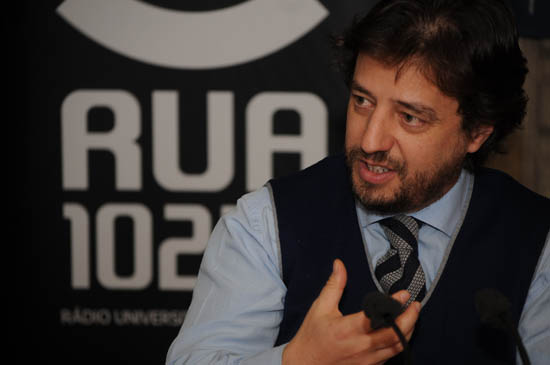


















Comments